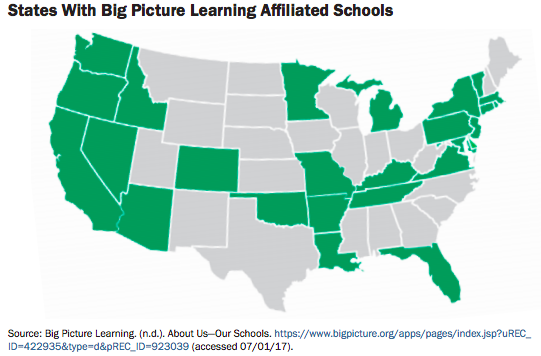What is Big Picture Learning?
For more information about Big Picture Learning, go to their website at http://www.bigpicture.org/.
We are a part of a large, international network of schools started in 1995 in the United States by Dennis Littki and Elliot Washor. There are around 65 schools in the United States and over 100 schools Internationally in Australia, Barbados, Belize, Canada, Israel, India, Italy, Kazakhstan, Kenya, the Netherlands, New Zealand, and the United Kingdom.

Big Picture Schools At A Glance:
- Our Motto is "One Student At A Time".
- Student is at the center of learning.
- Advisory-based relationship model.
- Curriculum is relevant to the world.
- Increased motivation.
- Learning Through Interests.
- Small by design.
- Parents/Guardians involved in the learning in real world settings.
- An effective method of learning for many different types of students.
The Big Ideas
 Each student at Durango Big Picture High School is part of a small learning community called an advisory that stay together all four years. Each mixed level advisory is supported and led by an advisor, a teacher that works closely with each advisee to identify their passions, interests and personalize their learning.
|
 Each student acquires an internship with a mentor, learning in a real-world setting. Parents and families are actively involved in the learning process, helping to shape the student’s learning plan and enrolled as resources to the school community. The result is a student-centered learning design, where students are actively invested in their learning and challenged to pursue their interests by a supportive community of educators, professionals, and family members. Internships are required each year.
|
 Personalized and Competency Based Learning. Students select projects to complete that are tailored to their interests. They can customize these by selecting state standards from different content areas and incorporating those into their projects. Students track their own progress, with the help of their advisor, and know exactly what progress they are making each semester.
|
 There are two academic levels. The first, Junior Institute, is generally the first two years of a student's time at the school. The Junior Institute requires establishing competency in each of the Gateway Keys areas and performing exhibitions every semester.
To be placed into Senior Institute, students must go before a committee and demonstrate readiness for the increased responsibilities. Senior Institute students are required to maintain the Gateway Keys, perform exhibitions every semester, create a lengthly autobiography, complete at least one college course, create a college portfolio of applications, scholarships and essays, complete the Senior Thesis and the Senior Exhibition.
|
Exhibitions
Each student performs exhibitions four times per year. These experiences give students a chance to demonstrate learning, reflect on their experience that quarter and practice doing this in front of their parent, advisor, and other school team members. Go HERE for a list of the Exhibition experiences.
The Gateway Keys
These 11 keys are arranged in 3 areas and are used by advisors and students to assess themselves and their accomplishments every quarter of the school year.
Personal
Knowing Yourself:
Having a deep connection or understanding of what drives you in your life academically, personally, and socially and what your strengths and weaknesses are in each area. Demonstrated through your accomplishments in which you use your strengths to overcome your weakness.
Self-Reflection:
Learning from your past and present and making changes in your behavior based on things that have happened. Learning and growing as a person. Not making the same mistakes twice.
Pursuing Passions:
Bringing what you love to do into what you have to do. Getting an internship in your area of interest and trying that interest to your independent projects, workshops, or book projects.
Social
Leading Responsibly:
Choosing actions and words that help, not hinder others. Giving advice, lending your time to help others or to motivate others to accomplish their goals. Being aware of the contributions of others to the group.
Acting Professionally:
Demonstrating time and place in dress, action/behavior, speech both in and out of school. Being prompt, punctual, and prepared. Someone who can keep an LTI or job, being able to handle challenges/obstacles and managing emotions in a mature way.
Communicating Effectively:
Organizing and sharing knowledge and information. Advocating for yourself and others. Being able to listen to, interpret, and respond to the thoughts and ideas of others.
Academic
Working Independently:
Being a self-starter and structuring your day without support, but knowing when and where to get help when it's needed.
Taking Control of Learning:
Advocating for yourself. Thinking of projects that interest you. Knowing what standards you have to hit to graduate. Asking for help when you need it and asking questions to clarify things you don't understand. Coming to class every day, working and doing the best you can. Finding ways to help yourself learn to your best ability, and making a well-completed project.
Challenging Yourself Academically:
Growing and strengthening skills and knowledge in academics by raising the level of quality and effort in each project. Completing projects to the best of your ability outside your comfort zone. Thinking about what you're learning, not just doing work for work's sake. Completing complex projects, real world problem solving, and taking your education to the next level.
Finding and Using Resources:
Academically demonstrating the ability to use valid primary and secondary sources, as well as people, to solve problems and create quality projects. Professionally using your contacts, both professional and personal to get internships or complete independent projects and workshops.
Organization:
Keeping track of work, dates, and anything of importance. Always knowing what is happening and what needs to be done and then following through and doing it.
